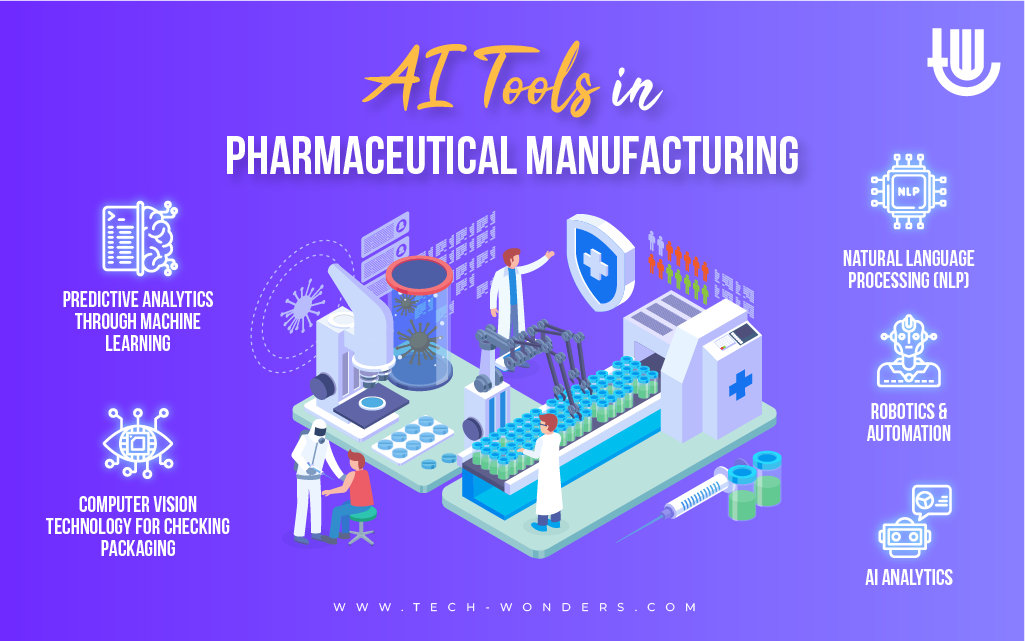The use of Artificial Intelligence (AI) tools has witnessed a rise in the pharmaceutical industry, aiming to boost production efficiency and ensure quality control. These innovative AI tools are transforming the landscape of pharmaceutical manufacturing by automating processes, minimizing errors, and expediting production timelines. This article explores some of the AI tools deployed in pharmaceutical manufacturing and their impact on enhancing production efficiency.

Predictive Analytics Through Machine Learning
Machine learning algorithms, one of the best AI tool applications, now play a role in analyzing manufacturing data to anticipate potential issues before they arise. By scrutinizing data from sources like manufacturing equipment, environmental conditions, and product quality, these machine-learning models can identify patterns and predict the likelihood of equipment failures or product defects.
For instance, if a machine learning model detects a pattern indicating a failure of equipment, proactive maintenance can be scheduled to prevent any downtime or disruptions in production. Similarly, if a machine learning model detects patterns suggesting defects within a batch of products, in that case, appropriate measures can be taken promptly to isolate and address the issue before it compromises product quality.
Using machine learning in analytics enables pharmaceutical manufacturers to tackle challenges proactively, minimize downtime, reduce waste, and uphold a higher level of product quality.
Robotics and Automation
Another significant tool in pharmaceutical manufacturing is robotics and automation, which leverages AI. This technology automates processes along the production line, encompassing pill filling, packaging, and labeling, proving that robotics and automation are the best AI tools to utilize.
Robotic arms equipped with AI-driven vision systems adeptly handle products with precision and efficiency. By eliminating the risks associated with error and reducing labor requirements, automation and robotics enhance production efficiency while saving costs. Additionally, these AI-powered robots can work continuously, ensuring more production and shorter product manufacturing timelines.
Natural Language Processing (NLP)
Quality control plays a role in pharmaceutical manufacturing as it ensures adherence to required standards and specifications for safety and regulatory compliance. Natural language processing (NLP), an AI tool specifically designed for this purpose, enhances quality control procedures.
NLP technology analyzes data, like standard operating procedures, batch records, and regulatory guidelines, to identify potential issues or discrepancies.
By analyzing and interpreting this data, natural language processing algorithms can notify manufacturers about areas that might need investigation or correction. This helps improve the accuracy and efficiency of quality control processes.
Computer Vision for Checking Packaging
Packaging issues can cause problems in the pharmaceutical industry, ranging from compromised product integrity to non-compliance with regulations. Computer vision, a branch of Artificial Intelligence focused on analyzing and recognizing images, is being utilized to inspect packaging for defects.
Computer vision systems powered by AI can examine real-time images of packaging to quickly detect problems like labeling, damaged packaging, or missing components. By automating this process, pharmaceutical manufacturers can minimize the chances of products entering the market, reduce waste, and enhance production efficiency.
Enhancing Processes Through AI Analytics
AI analytics platforms are being employed to optimize manufacturing processes in pharmaceutical production lines. These platforms continuously analyze data from sources such as sensors on manufacturing equipment, environmental conditions, and production parameters. Through this analysis, they identify areas that can be improved and suggest optimization strategies.
For instance, by examining data from equipment sensors, AI analytics platforms can pinpoint inefficiencies or bottlenecks in the production line. They then propose changes in equipment configuration or process parameters to enhance productivity.
AI analytics platforms have the ability to analyze conditions and make adjustments to factors like temperature and humidity. This ensures that the utmost level of product quality is achieved.
By utilizing AI analytics, pharmaceutical manufacturers can fine-tune their manufacturing processes, minimize waste, increase production efficiency, and ultimately provide consumers with products.
Conclusion
AI tools are transforming the pharmaceutical manufacturing landscape by enhancing production efficiency and quality control procedures. Predictive analytics powered by machine learning algorithms enable foresight while robotics and automation automate processes. Quality control is enhanced through natural language processing, packaging inspection benefits from computer vision technology, and manufacturing processes are optimized using AI analytics. Embracing these AI tools allows pharmaceutical manufacturers to streamline operations, reduce errors, and guarantee the production of top-notch medications for patients worldwide.